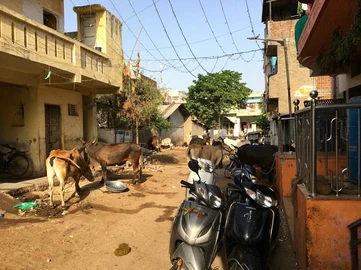Antimicrobial Resistance: A threat to Sustainable Development
April 26, 2019.
Growing antimicrobial resistance has been called "the greatest threat to sustainable development" by the World Health Organization. There is wide agreement that the root causes of the rise in resistance is the overuse of antimicrobials in agriculture, as well as in veterinary and human medicine.
Growing antimicrobial resistance is the topic of one of four research clusters at the <link https: www.zef.de onehealth.html external-link-new-window internal link in current>graduate school One Health and Urban Transformation, coordinated by ZEF.
Currently, 13 doctoral students conduct their research in four geographical regions: the Ruhr Metropolis (Germany), São Paulo (Brazil), Accra (Ghana), and Ahmedabad (India). Having joined the program in July 2017, the students completed their coursework at the Bonn International Graduate School for Development Research (BIGS-DR), and participated in the One Health seminar series.
Three One Health doctoral students are examining the spread of antimicrobial resistance from different perspectives in three of the four research regions. In the Ruhr Metropolis, the determinants of antibiotic use in the outpatient sector and the spread of antimicrobial resistance through wastewater are being analyzed. In São Paulo, the influence of diet on resistance genes in the human gut biome is being investigated, as the food chain represents a potential dissemination pathway.
n this study it is hypothesized that meat-based diets lead to higher quantities of resistance genes in the gut compared to plant-based diets. In Ahmedabad the spread of antimicrobial resistance between animals, humans and the environment is being investigated. The study explores the transmission of antimicrobial resistance from cows to humans, considering three pathways: direct contact, via shared surfaces and via milk products.
Besides the issue of antimicrobial resistance the graduate school investigates food systems, urban green-blue infrastructure, and 'one health' governance. The 'one health'-concept adopts an integrative perspective on health, recognizing the interconnections between human, animal and environmental health as environmental, social and economic systems that interact with and shape one another. Investigating these interactions in the context of urban transformation forms the basis for developing sustainable solutions that maximize synergistic effects, minimize trade-offs and mitigate health risks.
The One Health graduate school aims at recommending holistic policy approaches. Therefore, transdisciplinarity is of utmost importance. Prior to conducting research, workshops are organized in each location to facilitate transdisciplinary collaboration, establish direct communications with relevant stakeholders, and to ensure the local relevance and practical implementation of the research results.



